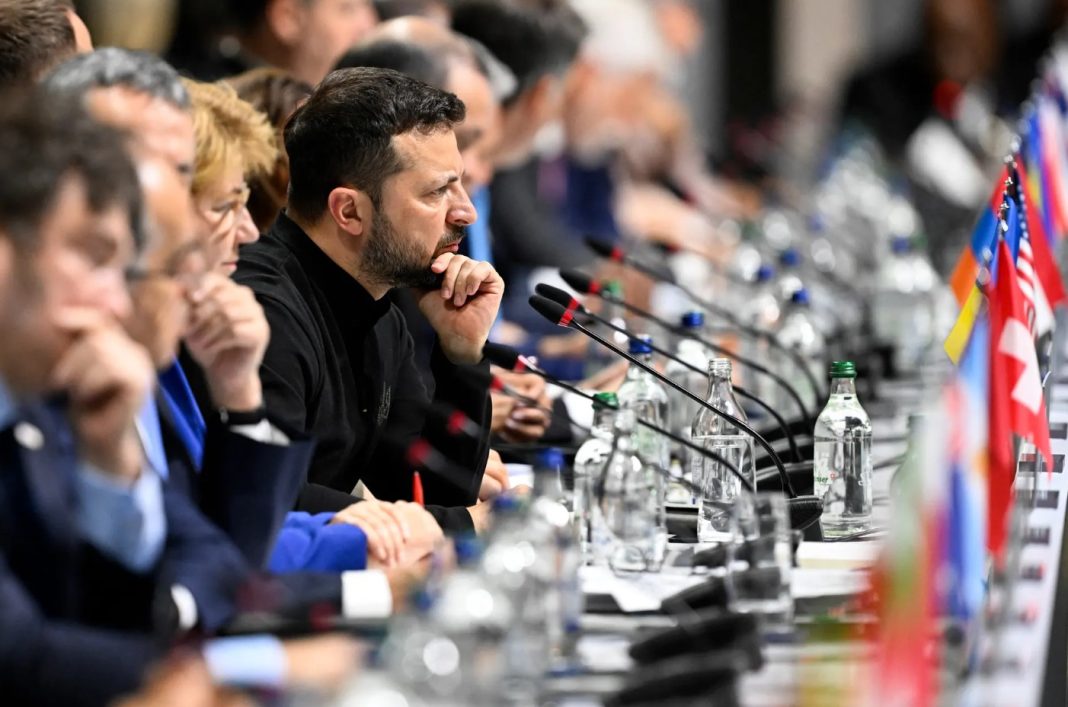The two-day summit was held to accelerate efforts to end the war in Ukraine, and came to a close on Sunday with dozens of countries committing to Ukraine’s territorial integrity.
War analysts have called President Vladimir Putin’s purported interest in peace negotiations merely a hollow attempt to “seduce” the West.
Putin mocked the summit as “just another ploy to divert everyone’s attention, reverse the cause and effect of the Ukrainian crisis [and] set the discussion on the wrong track”.
China, the country’s biggest ally, declined to attend, which assured the summit would fail to achieve Ukraine‘s goal of persuading major countries from the “global South” to join in isolating Russia.
Despite 90 countries attending the two-day conference, they failed to persuade major non-aligned states to join their final statement, and no country came forward to host another meeting.
Still, the conference provided Kyiv with a chance to showcase the support from Western allies that it says it needs to keep fighting against a far bigger enemy.
“We are responding to Russia‘s full-scale invasion of Ukraine not only with a full-scale defence of human life, but also with full-scale diplomacy,” Zelensky stated.
He told the BBC: “Russia can start negotiations tomorrow if they pull out of our territories.”
The event included presidents and prime ministers from France, Germany, Britain, Japan, Poland, Argentina, Ecuador, Kenya and Somalia. The Vatican was also represented, and vice president Kamala Harris spoke for the United States.
India, Mexico, Saudi Arabia, South Africa, Thailand and the United Arab Emirates – which were represented by foreign ministers or lower-level envoys – were among countries that did not sign the final document, which focused on issues of nuclear safety, food security and the exchange of prisoners. Brazil, an “observer”, did not sign on, but Turkey did.
Ursula von der Leyen, the president of the European Union’s executive Commission, said the conference was rightly titled “Path to Peace” because peace won’t be achieved in a single step.
“It was not a peace negotiation because Putin is not serious about ending the war. He is insisting on capitulation. He is insisting on ceding Ukrainian territory – even territory that today is not occupied by him,” she added.
“He is insisting on disarming Ukraine, leaving it vulnerable to future aggression. No country would ever accept these outrageous terms.”
It comes after Putin promised on Friday to “immediately” order a ceasefire in Ukraine and start negotiations if Kyiv began withdrawing troops from the four regions annexed by Moscow in 2022 and renounced plans to join NATO.
Zelensky rejected what he called an ultimatum by Putin to surrender more territory.
The summit’s final declaration called for Ukraine‘s control over the Zaporizhzhia nuclear plant and its Azov Sea ports to be restored.
But in line with the conference’s more modest stated aims, it omitted tougher issues of what a post-war settlement for Ukraine might look like, whether Ukraine could join the NATO alliance or how troop withdrawals from both sides might work.
